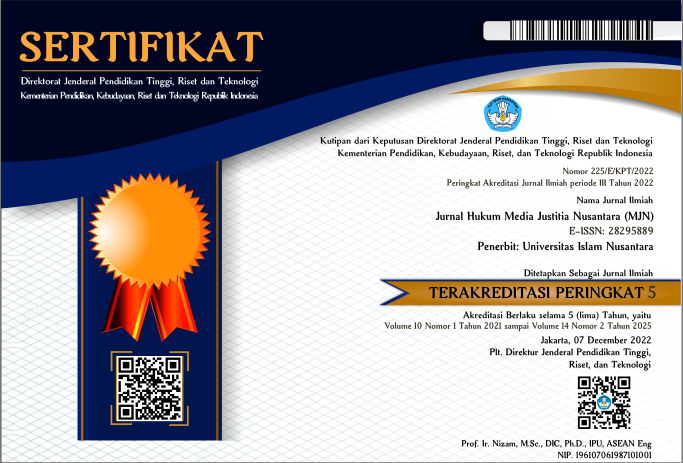Serious crimes and capital punishment in the history of criminal law are two components of closely related issues. This is apparent in the Indonesian Criminal Code which threatens serious crimes with capital punishment. Implementation of capital punishment reap the pros and cons this is motivated by various reasons. Plot murder accompanied by mutilation is a motive for murder committed sadistic and cruel, the motive is done to eliminate traces of deeds that have been done. Planning murder coupled with mutilation as an aggravating factor may be subject to a death sentence, this is because in murder it is not a qualified offense as the basis of ballast. The problem identification in the writing of this thesis involves: how is the existence of capital punishment for the crime of premeditated murder and how the criminal law enforcement related to capital punishment to murder murder is accompanied by mutilation as a burden. The research method used in this compiler is by using the normative juridical method while the specification of writing in this thesis is descriptive analysis, the research stage in this study is primary data obtained from field research and secondary data in the form of primary legal materials, secondary law materials and tertiary legal materials. Based on the description and analysis of the problem it is known that the existence or existence of capital punishment for the crime of premeditated murder is still maintained and valid until now in Indonesia, as it has been in accordance with the provisions of Article 340 of the Criminal Code. The existence of capital punishment as one of the criminal types that is still recognized in the Criminal Law System in Indonesia, is often associated with absolute theory in criminal prosecution. Criminal acts committed by perpetrators are considered very evil, because it interferes with public security, threatens the safety of the people, and is seen as an extraordinary crime (extra ordinary crime). In relation to the crime of premeditated murder as mentioned in Article 581 of the Criminal Code Bill, it also includes a capital punishment, but it can be threatened alternatively with other criminal types, such as life imprisonment or imprisonment of a minimum of five years and a maximum of 20 years. In this case, the draft of the Criminal Code does not specify mutilations specifically as a criminal offense, but if viewed from the provisions of Article 55 paragraph (1) of the Criminal Code Bill, then mutilation may constitute a motive and purpose of committing a crime (letter b); how to commit a crime; as well as the attitude and actions of the producers after committing a crime. As for the suggestion to be conveyed is the government must still maintain the threat of capital punishment by making the rules clearly and firmly against the perpetrators of criminal acts of premeditated murder. The need of the Indonesian Criminal Code is urgent, the government is reasonable, to immediately enact it, so that the provisions contained in Article 55 of the Criminal Code Draft can be used as a guideline for the judge in the imposition of criminal verdict against murder murder with mutilation as incriminating, law, namely the creation of legal certainty, legal benefit, and legal justice.
17-10-2019
Priyono, P. (2019). Eksistensi Pidana Mati Dalam Persfektif KUHP (Studi Kasus Pembunuhan Berencana Disertai Mutilasi Korban Berdasarkan Putusan Mahkamah Agung No. 25 PK/PID/2012). Jurnal Hukum Media Justitia Nusantara, 8(1), 10–22. https://doi.org/10.30999/mjn.v8i1.662
Article
Similar Articles
- Ahmad Kusnadi, Perlindungan Hukum Terhadap Kreditur Dalam Proses Lelang Parate Eksekusi Di Pt Bank Rakyat Indonesia (Persero) Tbk Dikaitkan Dengan Kolektibilitas Debitur (Studi Kasus Perkara Perdata Nomor 08/Pdt.Pwl/2011/PN.Tsm) , Jurnal Hukum Media Justitia Nusantara: Vol. 9 No. 2 (2019): September 2019
- Arief Mutaqin, Penerapan Asas Ultimum Remedium Terhadap Pelanggaran Baku Mutu Air Limbah Di Daerah Aliran Sungai (DAS) Citarum Berdasarkan Undang-Undang Nomor 32 Tahun 2009 Tentang Perlindungan Dan Pengelolaan Lingkungan Hidup , Jurnal Hukum Media Justitia Nusantara: Vol. 10 No. 1 (2020): Februari 2020
- Heni Yulianti, Kajian Hukum Terkait Pelanggaran Prosedur Kesehatan Dalam Upaya Pencegahan Dan Penanggulan Dampak Penularan Covid-19 , Jurnal Hukum Media Justitia Nusantara: Vol. 11 No. 2 (2021): September 2021
- Sunarya Ishak, Problematika Pelaksanaan Hibah Keagamaan Dan Potensi Tindak Pidana Korupsi Akibat Lemahnya Fungsi Pengawasan Dalam Penegakan Hukum , Jurnal Hukum Media Justitia Nusantara: Vol. 10 No. 1 (2020): Februari 2020
- Aep Sulaeman, Penyelundupan Hukum Dalam Penyelesaian Sengketa Utang-Piutang Dengan Cara Pembuatan Perjanjian Pengikatan Jual Beli Dihubungkan Dengan UndangUndang Nomor 4 Tahun 1996 Tentang Hak Tanggungan Atas Tanah Beserta Benda-Benda Yang Berkaitan Dengan Tanah , Jurnal Hukum Media Justitia Nusantara: Vol. 10 No. 2 (2020): September 2020
- Wawan Muhwan Hariri, Moh. Mahbub, Dewi Sulastri, Tindak Pidana Kekerasan Seksual dalam Perspektif Etiologi Kriminal , Jurnal Hukum Media Justitia Nusantara: Vol. 12 No. 2 (2022): September 2022
- Yeti Kurniati, Edy Santoso, Eddy Setiawan, Andrian Yogaparanatha, Doni Hanafi, Muhammad Fauzan, David Cahyadi, Rahelia, Agus, PERANAN KOMISI PENGAWAS PERSAINGAN USAHA TERKAIT PELANGGARAN PRAKTEK DISKRIMINASI USAHA , Jurnal Hukum Media Justitia Nusantara: Vol. 14 No. 2 (2024): September 2024
- Misna Misna, Pengalihan Status Kepemilikan Wakaf Dibawah Naungan Yayasan Berdasarkan Undang Undang No. 41 Tahun 2004 Tentang Wakaf Dan Undang Undang No. 16 Tahun 2001 Tentang Yayasan Menjadi Aset Pribadi Dalam Perspektif Kompilasi Hukum Islam , Jurnal Hukum Media Justitia Nusantara: Vol. 8 No. 2 (2018): September 2018
- Imas Rosidawati Wiradirja, PERLINDUNGAN HUKUM PEKERJAMIGRAN DARI TINDAKAN TRAFFICKINGDAN IMPLIKASINYA TERHADAP WACANA PERUBAHAN UU NO. 39 TAHUN 2004 TENTANG PENEMPATAN DAN PERLINDUNGAN TENAGA KERJA INDONESIA DI LUAR NEGERI , Jurnal Hukum Media Justitia Nusantara: Vol. 4 No. 2 (2015): September 2015
- Fontian Munzil, Tinjauan Umum Yuridis Teoritis Peranan Regulator Jasa Keuangan Atas Penerapan Prinsip Prudential Banking Terhadap Produk Peer To Peer Lending Pada Aplikasi Financial Technology Dalam Rangka Perlindungan Hukum Pemberi Pinjaman (Kreditur) Dan Penerima Pinjaman (Debitur) , Jurnal Hukum Media Justitia Nusantara: Vol. 8 No. 2 (2018): September 2018
You may also start an advanced similarity search for this article.













